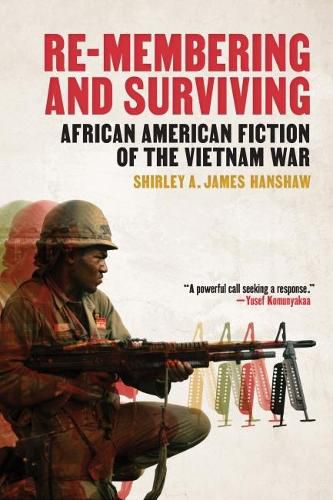Readings Newsletter
Become a Readings Member to make your shopping experience even easier.
Sign in or sign up for free!
You’re not far away from qualifying for FREE standard shipping within Australia
You’ve qualified for FREE standard shipping within Australia
The cart is loading…






The first book-length critical study of the black experience in the Vietnam War and its aftermath, this text interrogates the meaning of heroism based on models from African and African American expressive culture. It focuses on four novels: Captain Blackman (1972) by John A. Williams, Tragic Magic (1978) by Wesley Brown, Coming Home (1971) by George Davis, and De Mojo Blues (1985) by A. R. Flowers.
Discussions of the novels are framed within the historical context of all wars prior to Vietnam in which Black Americans fought. The success or failure of the hero on his identity quest is predicated upon the extent to which he can reconnect with African or African American cultural memory. He is engaged therefore in re-membering , a term laden with the specificity of race that implies a cultural history comprised of African retentions and an interdependent relationship with the community for survival.
The reader will find that a common history of racism and exploitation that African Americans and Vietnamese share sometimes results in the hero’s empathy with and compassion for the so-called enemy, a unique contribution of the black novelist to American war literature.
$9.00 standard shipping within Australia
FREE standard shipping within Australia for orders over $100.00
Express & International shipping calculated at checkout
The first book-length critical study of the black experience in the Vietnam War and its aftermath, this text interrogates the meaning of heroism based on models from African and African American expressive culture. It focuses on four novels: Captain Blackman (1972) by John A. Williams, Tragic Magic (1978) by Wesley Brown, Coming Home (1971) by George Davis, and De Mojo Blues (1985) by A. R. Flowers.
Discussions of the novels are framed within the historical context of all wars prior to Vietnam in which Black Americans fought. The success or failure of the hero on his identity quest is predicated upon the extent to which he can reconnect with African or African American cultural memory. He is engaged therefore in re-membering , a term laden with the specificity of race that implies a cultural history comprised of African retentions and an interdependent relationship with the community for survival.
The reader will find that a common history of racism and exploitation that African Americans and Vietnamese share sometimes results in the hero’s empathy with and compassion for the so-called enemy, a unique contribution of the black novelist to American war literature.